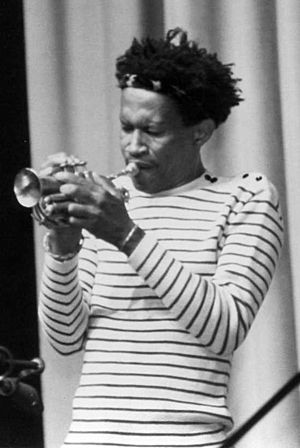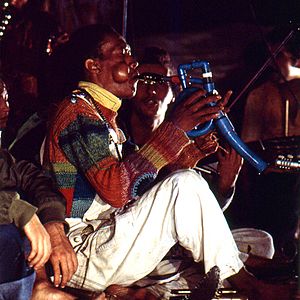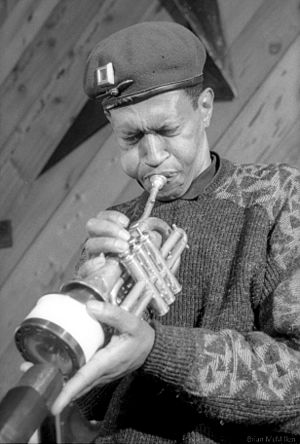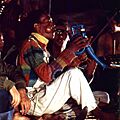Don Cherry (trumpeter) facts for kids
Quick facts for kids
Don Cherry
|
|
|---|---|

Don Cherry, Münster, 1987
|
|
| Background information | |
| Birth name | Donald Eugene Cherry |
| Born | November 18, 1936 Oklahoma City, Oklahoma, U.S. |
| Died | October 19, 1995 (aged 58) Málaga, Spain |
| Genres | Free jazz, world fusion |
| Occupation(s) | Musician |
| Instruments | Cornet, trumpet, wood flute, tambura, gamelan |
| Associated acts | Codona, Ornette Coleman, Paul Bley, Sonny Rollins, New York Contemporary Five, Naná Vasconcelos, La Monte Young, Old and New Dreams, Abdullah Ibrahim |
Donald Eugene Cherry (born November 18, 1936 – died October 19, 1995) was an amazing American jazz trumpeter. He was famous for playing with saxophonist Ornette Coleman, starting in the late 1950s. Don also played with many other great musicians like John Coltrane and Sun Ra.
In the 1970s, Don helped create "world fusion" music. This style mixed jazz with traditional music from Africa, the Middle East, and India. He was part of a group called Codona. They played with instruments like the sitar and tabla. Many people say he was one of the most important jazz musicians of his time.
Contents
Don Cherry's Early Life
Don Cherry was born in Oklahoma City, Oklahoma. His mother was from the Choctaw people, and his father was African-American. His family loved music. His mom and grandma played piano, and his dad played trumpet. Don's dad owned a music club called the Cherry Blossom Club. Famous musicians like Charlie Christian played there.
In 1940, Don's family moved to Los Angeles, California. They lived in the Watts area. His dad worked at the Plantation Club on Central Avenue. This street was a lively center for jazz music back then. Don remembered skipping school at Fremont High School. He wanted to play with the swing band at Jefferson High School. This led him to a different school, where he first met drummer Billy Higgins.
Don Cherry's Music Career
By the early 1950s, Don Cherry was playing jazz in Los Angeles. He sometimes played piano in Art Farmer's group. He also learned from trumpeter Clifford Brown at jam sessions. Don even toured with saxophonist James Clay.
Don became well known in 1958. He played and recorded with Ornette Coleman. First, they were in a group with pianist Paul Bley. Later, they formed a quartet, often without a piano, and recorded for Atlantic Records. Don's playing became very free during this time. He played without strict harmony rules.
Don also recorded with John Coltrane on the album The Avant-Garde. He toured with Sonny Rollins and was a member of the New York Contemporary Five. He also played with Albert Ayler and George Russell. His first album as a band leader was Complete Communion in 1965. This band included Ed Blackwell and saxophonist Gato Barbieri.
After leaving Coleman's group, Don often played in small groups. He also played many duets with drummer Ed Blackwell. He spent a long time living in Scandinavia. He traveled through Europe, India, Morocco, and South Africa. He wanted to learn and play with many different musicians. In the late 1960s, he settled in Sweden with his wife, Moki Cherry.
In 1968, Don Cherry taught music classes in Sweden. He invited musicians and artists from all over the world. For ten years, Don and Moki Cherry lived and worked in an old schoolhouse. They held classes, put on performances, and welcomed guests. They called their ideas the "Organic Music Society."
In 1969, Don played trumpet for poet Allen Ginsberg's album. It was called Songs of Innocence and Experience. He also played on Coleman's 1971 album Science Fiction. From 1976 to 1987, Don reunited with other Coleman band members. They formed a group called Old And New Dreams. They recorded four albums together.
In the 1970s, Don explored "world fusion music." He mixed sounds from the Middle East, Africa, and India into his jazz. He studied Indian music with Vasant Rai. From 1978 to 1982, he recorded three albums with his "world jazz" group Codona. This group included percussionist Naná Vasconcelos and sitar player Collin Walcott.
Don also worked with classical composer Krzysztof Penderecki in 1971. In 1973, he helped write music for the film The Holy Mountain. Later, in the late 1970s, his group Organic Music Theater played many live shows.
During the 1980s, he released El Corazon. This was a duet album with Ed Blackwell in 1982. He also made two albums as a bandleader: Home Boy (Sister Out) (1985) and Art Deco (1988). Don recorded again with the original Ornette Coleman Quartet in 1987.
He also played on projects like Carla Bley's Escalator Over The Hill. He was a sideman on albums by Lou Reed, Ian Dury, and Sun Ra. In 1994, Don appeared on a CD called Stolen Moments: Red Hot + Cool. This album helped raise awareness about the AIDS epidemic. Time magazine named it "Album of the Year."
Don Cherry's Death and Legacy
Don Cherry passed away on October 19, 1995. He was 58 years old. He died from liver cancer in Málaga, Spain.
In 2011, Don Cherry was honored. He was inducted into the Oklahoma Jazz Hall of Fame.
Don Cherry's Family
Don was married to Monika Karlsson, known as Moki Cherry. She was a Swedish painter and textile artist. She sometimes played an instrument called the tamboura on his recordings. His stepdaughter, Neneh Cherry, is a musician. His step-granddaughters Mabel and Tyson are also musicians. His sons, David Ornette Cherry, Christian Cherry, and Eagle-Eye Cherry, are musicians too. David Ornette Cherry passed away in 2022.
Don Cherry's Instruments
Don Cherry learned to play many brass instruments in high school. Throughout his career, he played the pocket cornet, trumpet, cornet, flugelhorn, and bugle.
He started his career as a pianist. He continued to play piano and organ sometimes.
After traveling in Africa, Don often played the donso ngoni. This is a harp-like instrument from West Africa. During his travels, he collected many non-Western instruments. He learned to play them and often used them in his performances. These included the berimbau, bamboo flutes, and various percussion instruments.
Don Cherry's Playing Style
Don Cherry was influenced by trumpet players like Miles Davis and Clifford Brown. Some critics noted that his technique wasn't always perfect. However, he was a master at making the trumpet sound like a voice. He would bend notes and add unique sounds. His solos were well-built, even with small flaws.
One writer, Ekkehard Jost, explained that playing free jazz was different. It didn't use old rules of harmony. So, the usual ways of playing fast and perfectly didn't apply. Don's style fit this new music perfectly.
Even Miles Davis changed his mind about Don's playing. At first, he didn't think Don was a good trumpet player. But after hearing him live, Davis was impressed. He even sat in with Don's group. Later, Davis said he liked Don Cherry's playing.
Discography
As leader or co-leader
| Recording date | Release date | Album | Label | Notes |
|---|---|---|---|---|
| 1960 | 1966 | The Avant-Garde | Atlantic | With John Coltrane |
| 1965 | 1966 | Togetherness | Durium | Also released as Gato Barbieri & Don Cherry |
| 1965 | 2020 | Cherry Jam | Gearbox | EP |
| 1965 | 1966 | Complete Communion | Blue Note | |
| 1966 | 2007 | Live at Cafe Montmartre 1966 Volume 1 | ESP-Disk | |
| 1966 | 2008 | Live at Cafe Montmartre 1966 Volume 2 | ESP-Disk | |
| 1966 | 2009 | Live at Cafe Montmartre 1966 Volume 3 | ESP-Disk | |
| 1966 | 1967 | Symphony for Improvisers | Blue Note | |
| 1966 | 1969 | Where Is Brooklyn? | Blue Note | |
| 1968 | 2021 | The Summer House Sessions | Blank Forms | |
| 1968 | 2013 | Live In Stockholm | Caprice | |
| 1968 | 1969 | Eternal Rhythm | MPS | |
| 1969 | 1969 | Mu First Part | BYG Records | With Ed Blackwell |
| 1969 | 1970 | Mu Second Part | BYG Records | With Ed Blackwell |
| 1969 | 1978 | Live Ankara | Sonet | |
| 1969-1970 | 1970 | Human Music | Flying Dutchman | With Jon Appleton |
| 1971 | 1971 | Actions | Philips | With Krzysztof Penderecki |
| 1971 | 1974 | Orient | BYG Records | |
| 1971 | 1974 | Blue Lake | BYG Records | |
| 1972 | 1972 | Organic Music Society | Caprice | |
| 1972 | 2019 | Universal Silence | Lepo Glasbo | With Carlos Ward and Dollar Brand |
| 1972 | 2021 | Organic Music Theatre Festival De Jazz De Chateauvallon 1972 | Blank Forms | With Naná Vasconcelos |
| 1973 | 1973 | Relativity Suite | JCOA | With the Jazz Composer's Orchestra |
| 1973 | 1974 | Eternal Now | Sonet | |
| 1975 | 1975 | Brown Rice | Horizon | Also released as Don Cherry |
| 1976 | 1977 | Hear & Now | Atlantic | |
| 1976 | 2020 | Om Shanti Om | Black Sweat | |
| 1982 | 1982 | El Corazón | ECM | With Ed Blackwell |
| 1985 | 1985 | Home Boy (Sister Out) | Barclay | |
| 1986 | 2002 | Nu: Live at the Bracknell Jazz Festival, 1986 | Barclay | |
| 1987 | 2021 | Nu: Live in Glasgow | Mark Helias self-released | |
| 1988 | 1989 | Art Deco | A&M | |
| 1988-1990 | 1990 | Multikulti | A&M | |
| 1993 | 1994 | Dona Nostra | ECM |
With Old and New Dreams
- Old and New Dreams (Black Saint, 1976)
- Old and New Dreams (ECM, 1979)
- Playing (ECM, 1980)
- A Tribute to Blackwell (Black Saint, 1987)
With Codona
- Codona (ECM, 1979)
- Codona 2 (ECM, 1981)
- Codona 3 (ECM, 1983)
As sideman
With Ornette Coleman
- Something Else!!!! (Contemporary, 1958)
- Tomorrow Is the Question! (Contemporary, 1959)
- The Shape of Jazz to Come (Atlantic, 1959)
- Change of the Century (Atlantic, 1960)
- Twins (Atlantic, 1959–60 [1971])
- The Art of the Improvisers (Atlantic, 1959–61 [1970])
- To Whom Who Keeps a Record (Atlantic, 1959–60 [1975])
- This is our Music (Atlantic, 1960)
- Free Jazz: A Collective Improvisation (Atlantic, 1960)
- Ornette! (Atlantic, 1961)
- Ornette on Tenor (Atlantic, 1961)
- Crisis (Impulse!, 1969)
- Science Fiction (Columbia, 1971)
- Broken Shadows (Columbia, 1971 [1982])
- In All Languages (Caravan of Dreams, 1987)
With the New York Contemporary Five
- Consequences (Fontana, 1963)
- New York Contemporary Five Vol. 1 (Sonet, 1963)
- New York Contemporary Five Vol. 2 (Sonet, 1963)
- Bill Dixon 7-tette/Archie Shepp and the New York Contemporary Five (Savoy, 1964)
With Albert Ayler
- Ghosts (Debut, 1964)
- The Hilversum Session (Osmosis, 1964)
- New York Eye and Ear Control (ESP, 1965)
- The Copenhagen Tapes (Ayler, 2002)
With Carla Bley
- Escalator over the Hill (JCOA, 1971)
With Paul Bley
- Live at the Hilcrest Club 1958 (Inner City, 1958 [1976])
- Coleman Classics Volume 1 (Improvising Artists, 1958 [1977])
With Bongwater
- Double Bummer (Shimmy-Disc [1988])
With Charles Brackeen
- Rhythm X (Strata-East, 1973)
With Allen Ginsberg
- Songs of Innocence and Experience (MGM, 1970)
With Charlie Haden
- Liberation Music Orchestra (Impulse!, 1969)
- The Golden Number (1976) (one track)
- The Ballad of the Fallen (ECM, 1986)
- The Montreal Tapes: with Don Cherry and Ed Blackwell (Verve, 1989 [1994])
With Abdullah Ibrahim
- The Journey (Chiaroscuro, 1977)
With Clifford Jordan
- In the World (Strata-East, 1969 [1972])
With Steve Lacy
- Evidence (New Jazz, 1962)
With Michael Mantler
- The Jazz Composer's Orchestra (ECM, 1968)
- No Answer (WATT/ECM 1973)
With Sunny Murray
- Sonny's Time Now (Jihad, 1965)
With Jim Pepper
- Comin' and Goin' (Europa, 1983)
With Sonny Rollins
- Our Man in Jazz (RCA Victor, 1962)
With George Russell
- George Russell Sextet at Beethoven Hall (MPS, 1965)
With Sun Ra
- Hiroshima (1983)
- Stars That Shine Darkly (1983)
- Purple Night (A&M, 1990)
- Somewhere Else (Rounder, 1993)
With Lou Reed
- The Bells (Arista, 1979)
With Charlie Rouse
- Epistrophy (Landmark, 1989)
With others
- Albert Heath and James Mtume along with Herbie Hancock and Ed Blackwell – Kawaida (1969)
- Alejandro Jodorowsky- The Holy Mountain Soundtrack (1973)
- Terry Riley – Terry Riley and Don Cherry Duo (B.Free, 1975)
- Steve Hillage – L (1976)
- Collin Walcott – Grazing Dreams (ECM, 1977)
- Latif Khan – Music/Sangam (1978)
- Johnny Dyani – Song for Biko (1978)
- Masahiko Togashi - Session In Paris, Vol. 1 "Song Of Soil" (Take One/King, 1979)
- Bengt Berger – Bitter Funeral Beer (ECM, 1981)
- Rip Rig + Panic – I Am Cold (1982)
- Bengt Berger Bitter Funeral Beer Band – Live in Frankfurt (1982)
- Dag Vag – Almanacka (1983)
- Frank Lowe – Decision in Paradise (Soul Note, 1984)
- Jai Uttal – Footprints (1990)
- Ed Blackwell Project – What It Be Like? Ed Blackwell Project Vol. 2 (1992) (one track)
Images for kids
See also
 In Spanish: Don Cherry para niños
In Spanish: Don Cherry para niños






